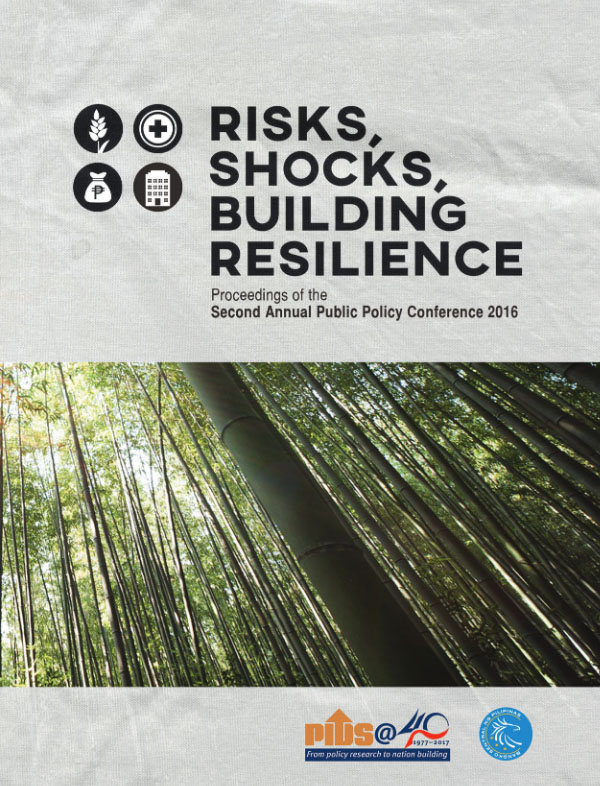For its second installment, PIDS repackaged the Annual Public Policy Conference (APPC) by organizing parallel sessions to discuss the conference theme “Risks, Shocks, Building Resilience”. The sessions delved on the issues affecting the resilience of the macroeconomic, agriculture, urban environment, and health sectors. The new format reflects the state think tank’s commitment to promote a systems approach in analyzing the impacts of risks and devising appropriate solutions to address them.
Leading the conversation were top Filipino political scientists, sociologists, and economists who presented their studies on fundamental issues pivotal in achieving resilience in the Philippines. Recognizing the risk landscape in the country, Socioeconomic Planning Secretary Ernesto Pernia emphasized the importance of building multiple resilience systems in sustaining the country’s economic gains.
On the aspect of agricultural resilience, discussions revolved around the current agricultural productivity support services to farmers, such as the agricultural insurance program and irrigation facilities. The agriculture sector continues to suffer from low productivity, primarily as a result of governance issues and destructive impacts of strong typhoons, floods, and droughts. Dr. Marites Tiongco of De La Salle University urged the government to monitor and evaluate the effectiveness of policies and programs in reducing the impacts of climate change and climate-related risks on agriculture. PIDS Senior Research Fellow Celia Reyes supported this, arguing that the current amount of insurance coverage, for instance, is not enough to finance replanting when disaster strikes. The poor structure and management, particularly of the government irrigation services, also deters the country from achieving agricultural resilience, according to Dr. Agnes Rola of the University of the Philippines (UP) Los Baños.
Meanwhile, experts highlighted the role of improved management and health workers’ welfare, and cross-sectoral collaborations in achieving resilience in the health sector. According to Dr. Orville Jose Solon, dean of the UP School of Economics, the country still endures the fragmented delivery and financing of public health services, which have led to a wide variation in access. He also called attention to the government’s failure to improve the technical coordination among health units, which can actually enhance the quality and efficiency of the health sector.
Aside from the physical infrastructure, the session also tackled the usually neglected issue of emotional resilience in the health sector. Department of Health Undersecretary Madeleine De Rosas-Valera urged the government not to abandon the welfare of the health workers, primarily in the face of stress. To achieve emotional resilience in the health sector, Valera recommended the adoption of professional and personal resilience that involves preorientation and debriefing activities. United Nations Children’s Fund Consultant, Johanna Banzon, backed Valera, arguing that investments in the emotional resilience of health workers can help improve the productivity of the sector.
Meanwhile, experts on urban environment called for an integrated policy approach to urban environment resilience. Dr. Marife Ballesteros, officer-in-charge of the PIDS Office of the Vice President, encouraged the public and the policymaking bodies to push for a holistic approach in addressing the risks in urban areas, such as Metro Manila, where the environmental problems are “most glaring”.
Dr. Emma Porio, sociologist from the Ateneo de Manila University, also raised the need for an integration of disciplines—the social and natural sciences—to maximize their strengths in crafting policies. She also encouraged policymakers to look at the interaction of the geophysical, political, economic, and social aspects of the Philippine society in addressing the policy gaps. Among these gaps, experts called for the review of the Philippine Disaster Risk Reduction and Management Act of 2010, which Ballesteros considered inadequate to counter the impacts of disasters in the country.
In terms of macroeconomic and financial resilience, experts targeted the contemporary issues of oil price shocks in the Middle East and weather disruptions and their effects on the services and manufacturing sectors in the Philippines. Univerity of Hawaii Department of Economics’ Dr. Arlan Brucal noted that the oil price shocks in the Middle East became a stunning blow to the country’s export labor and services, hurting the Philippine economy in the process. His study proves the interconnectedness of risks and highlights the importance of using a systems approach in analyzing risks.
Meanwhile, Dr. Philip Arnold Tuano and Dr. Ramon Clarete discussed the impact of Typhoon Ondoy, internationally known as Typhoon Ketsana, on the services and manufacturing sectors in Pasig and Marikina Cities. They found that the typhoon impacted the sectors differently, demonstrating the importance of disaggregated analyses of the impact of shocks, like weather disruptions, on the economy.
Since 2015, the APPC serves as the culminating event of the DPRM. This year, it centered on building resilient communities through educating policymakers and the public on the complex risk landscape confronting the Philippines.
The proceedings of the APPC 2016 may be downloaded from the PIDS website. Click on the image below to get a copy.

